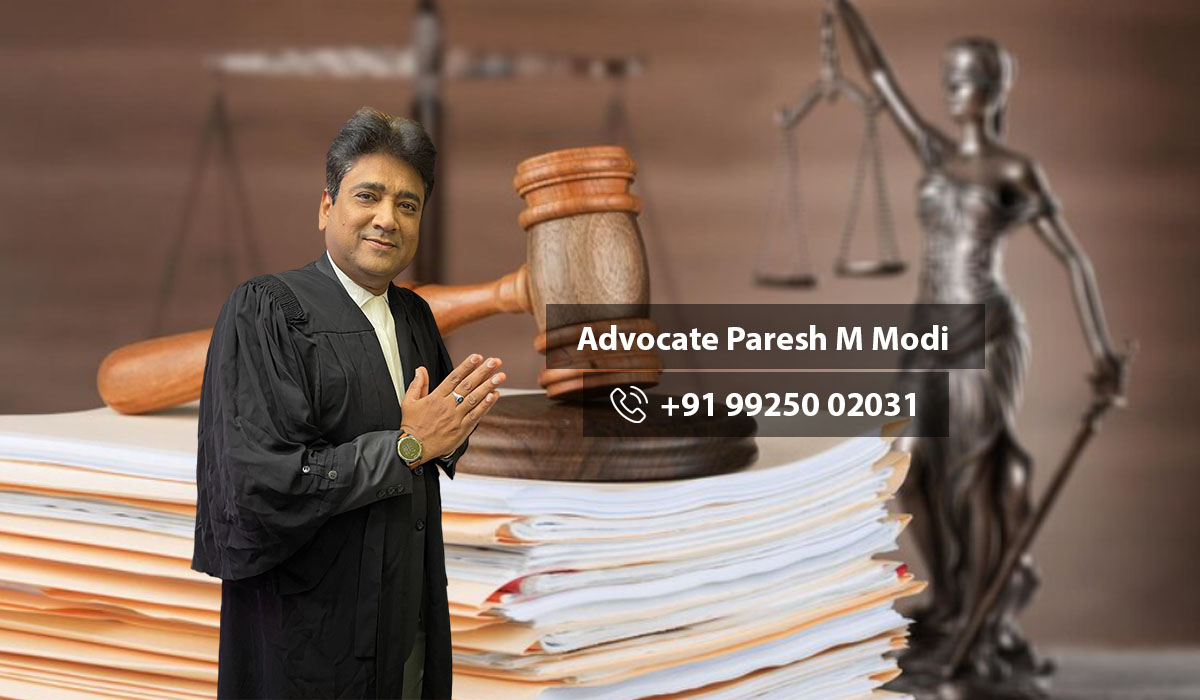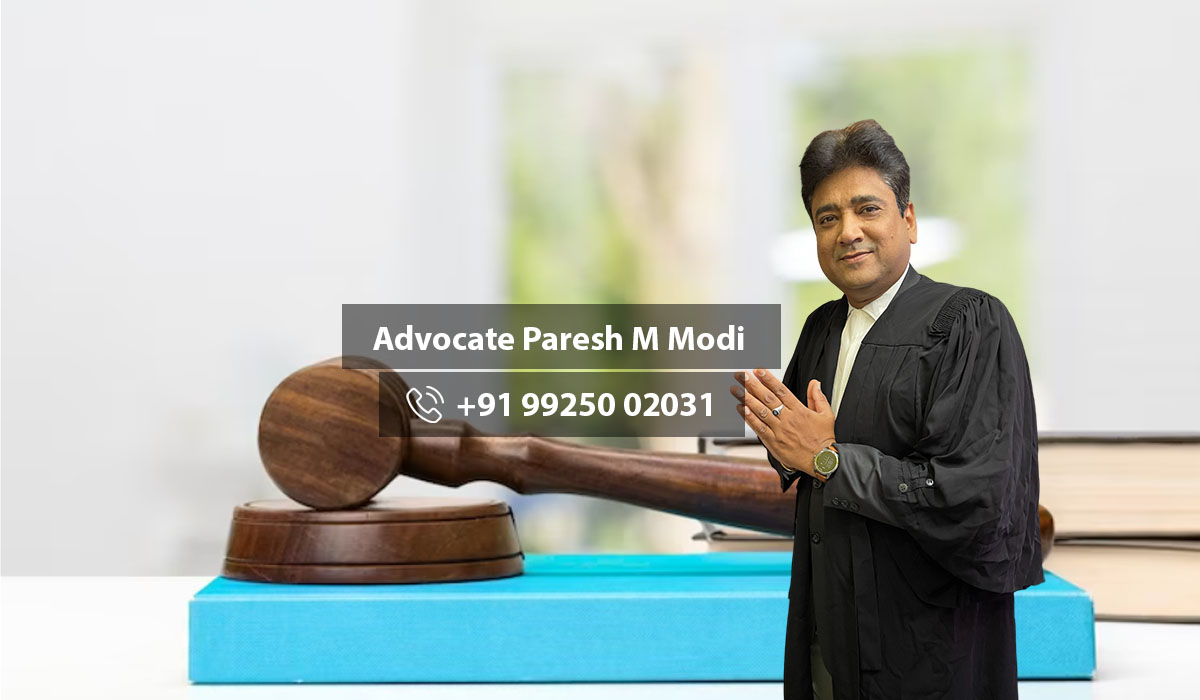Value, Liability, Responsibility, and Risk of an Advocate for Identifying and Signing Documents Submitted to the Police or Court | Advocate Paresh M Modi | 9925002031
Explanation
In India, an advocate plays a crucial role in the legal system, not only by representing clients in courts but also by verifying and authenticating documents. When an advocate identifies or signs a document submitted to a police station or court, it carries legal implications. The advocate’s responsibilities, liabilities, and risks depend on the nature of the document and the purpose for which it is signed.
1. Meaning of “Identify by an Advocate”
When an advocate “identifies” a document or person, it means they confirm the identity and authenticity of the signatory based on personal knowledge or verification. This usually happens in:
- Affidavits
- Bail Applications
- Power of Attorney Documents
- Witness Statements
- Legal Notices
- Verification in FIRs
The advocate must ensure that the individual signing the document is genuine, and the facts stated in the document are reasonably verified.
2. Liability of an Advocate for Signing Documents
If an advocate signs any document and submits it to the police station or court, their liability depends on the truthfulness of the contents and the legal purpose.
- Legal & Professional Liability: If the document contains false information or is misleading, the advocate may be questioned about the due diligence performed before signing.
- Criminal Liability: If an advocate knowingly signs a false or forged document, they could be prosecuted under Section 191, 192, 199, 200, and 209 of the Indian Penal Code (IPC) for perjury, false evidence, or fraud.
- Professional Misconduct: The Bar Council of India (BCI) and the Advocates Act, 1961, hold advocates accountable for unethical practices. If found guilty, an advocate may face disciplinary action, including suspension or disbarment.
- Third-Party Liability: If the document is used for unlawful purposes, and the advocate has negligently or intentionally assisted in the deception, they may be held responsible under contract and tort laws.
3. Responsibilities of an Advocate While Signing Documents
Before signing any legal document, an advocate should:
✅ Verify the identity of the person presenting the document.
✅ Ensure the document’s contents are legally sound.
✅ Keep proper records of signed documents.
✅ Refuse to sign if there is any suspicion of forgery or misrepresentation.
An advocate should NEVER sign a document without proper verification, as it can lead to legal consequences.
4. Risks Involved for an Advocate in Signing Documents
⚠️ Forgery Risk: If a document turns out to be forged, the advocate could be accused of aiding fraud.
⚠️ False Affidavits & Misleading Information: If an affidavit or legal notice signed by an advocate contains false statements, it can be challenged in court, and the advocate may face consequences.
⚠️ Disciplinary Action: If the advocate is found negligent or dishonest, they may be reported to the Bar Council, leading to penalties or suspension.
⚠️ Legal Consequences in Criminal Cases: If an advocate signs a document related to a criminal matter, they may be called for investigation or be made a witness.
In conclusion, an advocate must exercise extreme caution, professional integrity, and due diligence before signing or verifying any document for submission to the police or courts.
ગુજરાતીમાં સમજાવટ
1. “એડવોકેટ દ્વારા ઓળખ” નો અર્થ શું છે?
“એડવોકેટ દ્વારા ઓળખ” એનો અર્થ એ છે કે એડવોકેટ કાયદેસર દસ્તાવેજ કે વ્યક્તિની ઓળખ પુષ્ટિ કરે છે. સામાન્ય રીતે, આ પ્રક્રિયા નીચેના દસ્તાવેજોમાં થાય છે:
- હલફનામા (Affidavit)
- જામીન અરજી (Bail Application)
- પાવર ઓફ એટર્ની (Power of Attorney)
- સાક્ષીની નિવેદન (Witness Statements)
- કાનૂની નોટિસ (Legal Notice)
- FIR માં નોંધણી (Verification in FIRs)
એડવોકેટે ખાતરી કરવી જોઈએ કે દસ્તાવેજમાં આપેલી માહિતી સાચી અને કાયદેસર છે.
2. એડવોકેટની જવાબદારી અને જવાબદારી (Liability & Responsibility)
જો એડવોકેટ કોઈ દસ્તાવેજ પર સહી કરે છે અને તે પોલીસ સ્ટેશન કે કોર્ટમાં રજૂ થાય છે, તો એડવોકેટની જવાબદારી નીચે મુજબ હોય છે:
🔹 કાનૂની જવાબદારી (Legal Liability): જો દસ્તાવેજ ખોટી માહિતી આપે છે, તો એડવોકેટની ભૂમિકા તપાસવામાં આવી શકે છે.
🔹 ફોજદારી જવાબદારી (Criminal Liability): જો એડવોકેટ ખોટા દસ્તાવેજ પર સહી કરે છે, તો તેઓ IPC ની કલમ 191, 192, 199, 200 અને 209 હેઠળ દોષિત ઠરી શકે છે.
🔹 વ્યાવસાયિક આચરણ (Professional Misconduct): એડવોકેટ એક્ટ, 1961 હેઠળ, ખોટા દસ્તાવેજ પર સહી કરવી એ વ્યવસાયિક ગેરવર્તન છે, અને તેમને બાર કાઉન્સિલ દંડ કે નિષ્કાસિત કરી શકે છે.
🔹 ત્રિજ્ઞાત કાનૂની જવાબદારી (Third-Party Liability): જો દસ્તાવેજ કોઈ ગેરકાયદેસર પ્રવૃત્તિ માટે વપરાય છે, તો એડવોકેટને પણ જવાબદાર ઠરાવી શકાય.
3. એડવોકેટે દસ્તાવેજ પર સહી કરતા પહેલાં શું ધ્યાન રાખવું?
✅ દસ્તાવેજ લાવનાર વ્યક્તિની ઓળખ ખાતરી કરવી.
✅ દસ્તાવેજ કાયદેસર છે કે નહીં તેની તપાસ કરવી.
✅ કોઈપણ શંકાસ્પદ દસ્તાવેજ પર સહી કરવાની ના પાડવી.
✅ દસ્તાવેજોનું રેકોર્ડ રાખવું.
જો કોઈ દસ્તાવેજ ખોટો કે બનાવટી હોય અને એડવોકેટે સહી કરી હોય, તો તે કાયદેસર મુશ્કેલીઓમાં પડી શકે છે.
4. એડવોકેટ માટે જોખમ (Risk for Advocates)
⚠️ દસ્તાવેજ બનાવટી સાબિત થાય તો ફોજદારી કેસ થઈ શકે.
⚠️ FIR કે કોર્ટમાં ખોટા દસ્તાવેજ દાખલ કરવા પર IPC હેઠળ ગુનો નોંધાય.
⚠️ બાર કાઉન્સિલ દ્વારા એડવોકેટને દંડ કે સસ્પેન્ડ કરી શકાય.
⚠️ કોર્ટમાં સાક્ષી તરીકે બોલાવવામાં આવી શકે.
સંદિગ્ધ દસ્તાવેજ પર સહી કરવી એ એડવોકેટ માટે કાનૂની અને વ્યવસાયિક જોખમ ઊભું કરી શકે છે.
એડવોકેટને હંમેશા જવાબદારીપૂર્વક અને કાયદેસરની સાવચેતી સાથે દસ્તાવેજો તપાસીને જ સહી કરવી.
નિષ્કર્ષ (Conclusion)
એડવોકેટ દ્વારા સહી કરાયેલ દસ્તાવેજમાં સત્યતા અને કાયદેસર પ્રક્રિયાનો આધાર હોવો જોઈએ. ખોટા દસ્તાવેજ કે ગેરકાયદેસર માહિતી પર સહી કરવાથી એડવોકેટની કાનૂની અને વ્યવસાયિક જવાબદારી ઉદ્ભવી શકે છે. તેથી, સાવચેત રહેવું અને સહી કરતા પહેલા સંપૂર્ણ તપાસ કરવી જરૂરી છે.
Contact Advocate Paresh M Modi
In Ahmedabad, Gandhinagar, Gujarat, Mumbai, Maharashtra, Pune, Delhi, For legal consultation or representation in matters of Corporate disputes, Employee- Employer Matters, Salary- Wages Matters, Anticipatory bail, Regular bail, Discharge Applications, Special Act Cases, FIR Quashing, Cheque Return Cases, or Criminal Appeals and For expert legal advice and services, Advocate Paresh M Modi can be contacted during office hours.
- Office Landline: 079-48001468 (Time 10:30 AM to 6:30 PM, Monday to Saturday).
- WhatsApp SMS: 9925002031 (Time 9:00 AM to 9:00 PM).
- Email: advocatepmmodi@gmail.com.
- Website: www.advocatepmmodi.in.
- Office Address: Office No. C/112, Supath-2 Complex, Opp. Kohinoor Plaza Hotel, Near Old Wadaj Bus Stand, Ashram Road, Ahmedabad – 380013, Gujarat, India.




